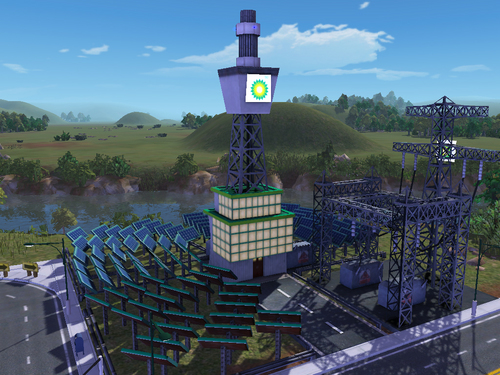
The SimCity series has always given players a wide array of choices for powering their city, but Societies is notable for being the first game that specifically brands the eco-friendly power solutions with BP logos and likenesses.
In an apparent effort to explore the currently pressing issues of pollution and global warming, publisher Electronic Arts and energy giant BP have collaborated to incorporate a global warming minigame in SimCity: Societies, which is available now for the PC. In addition to traditional coal and nuclear power plants, the latest SimCity game also offers greener solutions such as wind farms and solar stations. The environmentally-sound – and BP branded – power options naturally cost more money to build and maintain, but yield significantly less pollution in the virtual city.
Electronic Arts and BP explain the workings of their collaboratively developed game system in the press release: “Players can strive to create a greener environment and avoid hazards caused by excessive carbon emissions by choosing from a variety of BP Alternative Energy low-carbon power options. Using hydrogen and natural gas plants to wind farms and solar power, SimCity: Societies encourages people to learn about some of the causes and consequences of global warming in an engaging, educational and meaningful way. While these power sources maintain nearby property values and keep the cities’ citizens safer from disaster, they also mimic real-life in that they cost players more of their funds, and do not produce as much power as less green options that take up similar space. Informative real-world snippets about power production and conservation will also be available in-game, informing players of global warming issues both virtually and in reality.”
This all sounds well and good, but because this facet of Societies’ design is corporate sponsored, it gives good reason to be wary of how the game actually teaches about the sources of pollution. Neither Electronic Arts nor BP has revealed the algorithms behind how pollution levels are actually determined in the game.
In the February issue of Games for Windows magazine, Vice President of BP’s Alternative Energy division Carol Battershell explains, “We saw that there was an issue that wasn’t very well understood, that electricity is really important to climate change. Twice as many CO2 emissions come from making electricity as from all forms of transportation combined.”
In Societies’ global warming minigame, the player’s choice of power plants affects pollution the most, largely ignoring the fact that transportation still accounts for a significant amount of dirty air. The choices players have for clean power sources are branded with the BP logo, yet in the real world the company remains focused on oil production and exploration rather than new energy sources.
The contextual accuracy of Battershell’s statement isn’t so much of a concern as is the way BP consciously portrays itself as a squeaky-clean energy company through the power options in SimCity: Societies. In fact, the article notes that just weeks before the EA/BP collaboration announcement, BP paid $50 million in criminal fines and “plead guilty to a felony violation of the Clean Air Act” as a result of a fatal refinery explosion in 2005 and a massive oil spill in 2006.
Companies like BP always look for ways to reach out to consumers and improve their image in the public eye – what they are doing in the sponsored portion of SimCity: Societies is essentially nothing new. However, it is interesting to see that companies are noticing the potential effectiveness of teaching certain values through games – whatever those values may be. Far more subtle but much more immersive than simple in-game advertisements and billboards, BP has successfully attempted to portray itself as a clean energy provider, and Electronic Arts can now say they are a publisher of positive value-laden games. It seems that a trend of “corporate sponsored values” in games may be emerging, as it has here in one of the most popular gaming franchises.
Is this a trend to keep a scrutinizing eye on, or is there really no harm in a bunch wind farms in your virtual city with the BP logo – or that of any other company – slapped on them? Is this just advertising as usual or something more significant? Share your thoughts!

